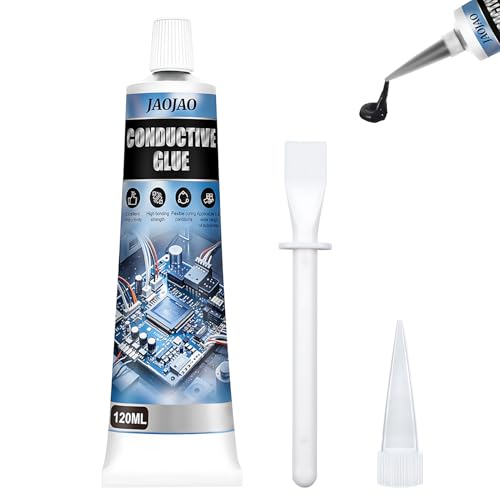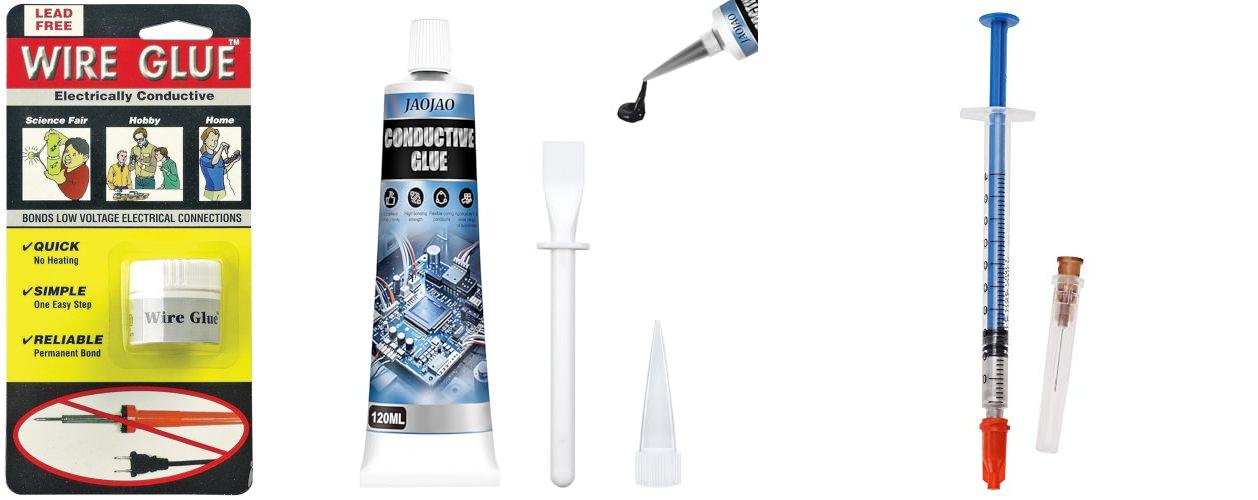Imagine a world where broken electronics can be fixed with a simple dab of glue. Or what if you could easily add conductive pathways to your own DIY projects? That’s the power of electrically conductive glue! It’s a special kind of adhesive that can carry electricity, opening up a universe of possibilities for repairs and inventions. But finding the perfect conductive glue can feel like searching for a needle in a haystack. So many types exist, and it’s tough to know which one will work best for your specific needs.
Choosing the wrong conductive glue can lead to frustrating failures. You might end up with a connection that’s too weak, too brittle, or just doesn’t conduct electricity at all. This can be a real headache, especially when you’ve spent time and effort on a project. But don’t worry! This blog post is here to guide you through the exciting world of electrically conductive glues. We’ll break down what makes them tick and help you understand how to pick the right one for your next brilliant idea or urgent repair.
By the time you finish reading, you’ll feel much more confident about selecting the best electrically conductive glue for your projects. We’ll explore different types, what they’re good for, and what to look out for. Get ready to unlock a new level of creativity and problem-solving as we dive into the amazing world of conductive adhesives!
Our Top 5 Electrically Conductive Glue Recommendations at a Glance
| Image | Product | Rating | Links |
|---|---|---|---|
 |
Electrically Conductive Wire Glue | 9.0/10 | Check Price |
 |
JAOJAO Conductive Glue | 9.2/10 | Check Price |
 |
Silver Conductive Paste | 9.2/10 | Check Price |
 |
Permatex 21351 Electrically Conductive Rear Window Defogger Tab Adhesive | 8.6/10 | Check Price |
 |
Electrically Conductive Epoxy | 9.3/10 | Check Price |
Top 5 Electrically Conductive Glue Detailed Reviews
1. Electrically Conductive Wire Glue
Rating: 8.7/10
Electrically Conductive Wire Glue is like a soldering gun in a jar! It’s a super handy solution when you need to connect wires but can’t use a regular soldering iron. This glue works for low-voltage AC and DC circuits. It creates a strong, permanent bond. It’s also really easy to use.
What We Like:
- It’s a great alternative to a hot soldering iron.
- You can use it when you’re camping or in the woods.
- It’s perfect for situations where you can’t get both hands to the connection.
- It conducts electricity for low-voltage circuits.
- The bond it creates is permanent.
- It’s very easy to apply, especially with a toothpick.
- It cures overnight, making it convenient.
What Could Be Improved:
- It only comes in a small 0.3 oz/9ml jar.
- The product description doesn’t mention how long the bond will last over many years.
- We don’t know if it works for higher voltage applications.
This conductive wire glue is a clever tool for many electrical projects. It offers a simple and effective way to make wire connections when traditional methods aren’t an option.
2. JAOJAO Conductive Glue
Rating: 9.1/10
Are you tired of broken electronics? Do you need to fix a circuit board or a solar panel? The JAOJAO Conductive Glue is here to help! This special glue lets electricity flow through it after it dries. It’s great for making connections, protecting circuits, and holding things in place. This glue is strong and lasts a long time. It even dries waterproof and can handle heat and shaking.
What We Like:
- It makes strong connections that last.
- It’s waterproof and heat-resistant, so it won’t break easily.
- It’s perfect for fixing circuit boards, solar panels, and other electronics.
- It comes with a scraper to make applying it easier.
- It’s a versatile tool for many electronic repairs.
What Could Be Improved:
- It takes 24 hours to fully dry and become conductive.
- It needs careful application to ensure a good connection.
This conductive glue is a reliable choice for anyone who needs to repair or build electronic projects. It provides a durable and conductive solution for your needs.
3. Silver Conductive Paste
Rating: 9.4/10
Fixing small electronic problems just got easier with this Silver Conductive Paste, Silver Conductive Paint Wire Glue Paste Silver Paint Pen. This handy pen lets you draw conductive lines, acting like a tiny wire for your electronic projects and repairs. It’s great for connecting parts or fixing broken circuits.
What We Like:
- It works great for blocking unwanted signals, giving you over 80db of shielding.
- It sticks really well to different kinds of plastic, like ABS and PC.
- It makes strong, lasting electrical connections that won’t break easily.
- The silver paint is tough and resists wear, moisture, and dryness, so it lasts a long time.
- It forms a hard, durable coating that doesn’t flake off.
- You can speed up drying by using a hairdryer on a warm setting for a few minutes.
- It sticks to many surfaces, including plastic films, glass, and metal.
- The conductive glue stays mixed and doesn’t separate easily.
What Could Be Improved:
- The amount is small (0.2ml), so it might not be enough for very large or numerous repairs.
- While it works on many surfaces, testing on a small, hidden area first is always a good idea.
This silver conductive pen is a useful tool for anyone who likes to tinker with electronics or needs to make quick fixes. It offers reliable performance for a variety of repair needs.
4. Permatex 21351 Electrically Conductive Rear Window Defogger Tab Adhesive
Rating: 9.1/10
The Permatex 21351 Electrically Conductive Rear Window Defogger Tab Adhesive is a handy product for fixing your car’s rear defogger. If a defogger tab on your back window breaks, this kit helps you fix it easily. It’s designed to make the repair simple and effective. You can get your defogger working again without a big expense.
-
What We Like:
- It bonds defogger tabs to your rear window quickly and easily.
- It offers a cheap but good way to fix broken defogger tabs.
- The kit has everything you need for a fast repair.
- It holds up well in all kinds of weather, even extreme conditions.
- It’s made for fixing rear window defogger tabs.
-
What Could Be Improved:
- The instructions could be a little clearer for first-time users.
- More detailed diagrams would be helpful for complex repairs.
This adhesive is a great solution for a common car problem. It saves you money and gets your rear window defogger back in working order.
5. Electrically Conductive Epoxy
Rating: 9.0/10
The AA-Duct 902 is a special kind of glue. It’s an electrically conductive epoxy, which means it can conduct electricity. This silver adhesive is great for fixing things that need to conduct electricity. It dries at room temperature, so you don’t need a special oven. This 2.5gm kit comes with everything you need in one pack.
What We Like:
- It conducts electricity really well.
- It’s strong and lasts a long time.
- It works in a wide range of temperatures, from very cold to quite hot.
- It dries on its own at room temperature, which is super convenient.
- It sets quickly when you heat it up.
- It’s not too messy to work with; it’s a paste.
What Could Be Improved:
- It takes a long time to fully dry if you don’t heat it.
- The kit is small, so it might not be enough for very large jobs.
This silver epoxy is a fantastic tool for anyone who needs to make electrical connections. It offers a reliable and strong bond that can handle tough conditions.
Your Guide to Electrically Conductive Glue
Electrically conductive glue is a special kind of glue. It lets electricity flow through it. This makes it useful for many projects. You can fix electronics or make new ones. This guide will help you choose the best conductive glue for your needs.
Key Features to Look For
1. Conductivity Level
How well does the glue let electricity pass through? This is very important. Some glues are better than others. Look for glues that clearly state their conductivity. This is often measured in ohms per square. Lower numbers are better. They mean electricity flows more easily.
2. Curing Time and Method
How long does it take for the glue to dry? Some glues dry fast. Others take a long time. Some need heat to dry. Others dry on their own. Think about your project. Do you need to work fast? Or can you wait?
3. Flexibility and Durability
Will the glued part bend or move? Some conductive glues stay stiff. Others stay a little flexible. You also want the glue to last. It should not break down easily. Check if the glue is strong. Will it hold things together well?
4. Shelf Life
How long can you keep the glue before it goes bad? Some glues last a long time. Others do not. Check the expiration date. You don’t want to buy glue that won’t work when you need it.
Important Materials
Conductive glues have special ingredients. These make them conduct electricity. Common materials include:
- Metal particles: Silver, copper, or nickel are often used. These metals let electricity flow.
- Epoxy or resin: This is the base of the glue. It holds the metal particles together. It also sticks to surfaces.
- Solvents: These help the glue spread and dry.
Factors That Improve or Reduce Quality
What Makes Good Conductive Glue?
- High amount of metal: More metal particles usually mean better conductivity.
- Small metal particles: Tiny particles can spread out better. This helps electricity flow smoothly.
- Good mixing: The metal and the glue must be mixed well. This makes the glue strong and conductive.
What Makes Bad Conductive Glue?
- Too much binder: If there is too much glue and not enough metal, it won’t conduct well.
- Large or uneven particles: Big clumps of metal can make the glue weak. They can also block electricity.
- Old or dried-out glue: If the glue is old, it might not work properly.
User Experience and Use Cases
People use conductive glue for many things. It’s great for fixing broken wires in electronics. You can use it to add circuits to projects. Artists use it for special effects. Hobbyists fix toys and models. Scientists use it in labs for experiments. You can even use it to make touch sensors for computers.
When using conductive glue, follow the instructions carefully. Wear gloves to keep your hands clean. Make sure the surfaces you are gluing are clean and dry. This helps the glue stick well and conduct electricity.
Frequently Asked Questions (FAQ)
Q: What is electrically conductive glue?
A: It is a special glue that allows electricity to pass through it.
Q: What are the main Key Features I should look for?
A: Look for the conductivity level, how it cures, its flexibility, durability, and shelf life.
Q: What materials are usually in conductive glue?
A: It often contains metal particles like silver or copper, mixed with an epoxy or resin base.
Q: How can I tell if conductive glue is good quality?
A: Good quality glue has a high amount of small, well-mixed metal particles. It also has a low resistance to electricity.
Q: What can I use conductive glue for?
A: You can use it for fixing electronics, making circuits, art projects, and science experiments.
Q: Does conductive glue dry fast?
A: Some do, but others take longer to dry. Some might need heat to cure.
Q: Is conductive glue strong?
A: Yes, good conductive glues are also strong and hold things together well.
Q: Can I use conductive glue on any surface?
A: It works best on clean and dry surfaces. Always check the product’s recommendations.
Q: How should I store conductive glue?
A: Store it in a cool, dry place, away from direct sunlight. Check the expiration date.
Q: Is conductive glue safe to use?
A: It is generally safe if used as directed. Always wear gloves and avoid contact with skin and eyes.
In conclusion, every product has unique features and benefits. We hope this review helps you decide if it meets your needs. An informed choice ensures the best experience.
If you have any questions or feedback, please share them in the comments. Your input helps everyone. Thank you for reading.

